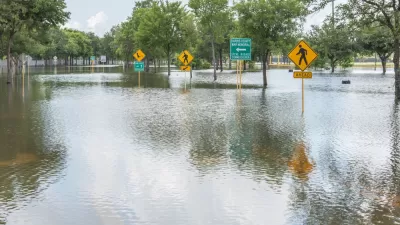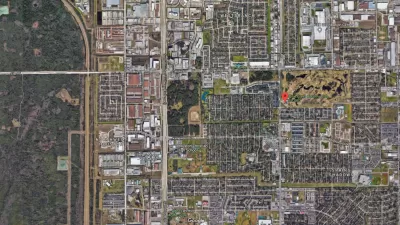A new Flood Resilience Trust will create a permanent source of funding for flood control purposes, but the county still faces a shortfall for planned projects.

Harris County, Texas, home to Houston, "will unveil a new plan to address a funding gap for its flood bond program, which will rely more heavily on diverted toll road revenue instead of federal aid that may never arrive." The county's Commissioners Court also plans to "approve a new, permanent fund for flood control purposes and give priority to the most vulnerable areas to receive aid from it." The plan also comes on the heels of analysis that shows a disparity in funding: ""In March, the county announced that some of the watersheds with the wealthiest communities, such as White Oak and Buffalo bayous, had their projects close to fully funded." Meanwhile, "[w]atersheds with some of the county’s poorest neighborhoods, such as Halls and Greens bayous, had less than half the necessary dollars," reports Zach Despart in the Houston Chronicle.
"The revised strategy sprang from county officials’ realization this year that the original bond plan is not working. Voters in 2018 passed the $2.5 billion bond, though the county planned about $5 billion in mitigation projects — such as detention basins, buyouts and channel improvements — while anticipating federal matching dollars would pay for the rest." The new fund, known as the Flood Resilience Trust, "would direct Harris County Toll Road Authority revenue — a lump sum of $230 million plus $40 million annually — to a new Flood Resilience Trust. This account would be used to plug funding holes in projects where federal aid failed to arrive." But as Despart writes, "[t]he plan still leaves approved projects $950 million short, however, raising the possibility that a new bond or flood control tax increases may be needed in the future to pay for all planned projects, according to budget office documents."
FULL STORY: Harris County plans to use toll road money fixes flood bond funding problem - for now

Study: Maui’s Plan to Convert Vacation Rentals to Long-Term Housing Could Cause Nearly $1 Billion Economic Loss
The plan would reduce visitor accommodation by 25,% resulting in 1,900 jobs lost.

North Texas Transit Leaders Tout Benefits of TOD for Growing Region
At a summit focused on transit-oriented development, policymakers discussed how North Texas’ expanded light rail system can serve as a tool for economic growth.

Why Should We Subsidize Public Transportation?
Many public transit agencies face financial stress due to rising costs, declining fare revenue, and declining subsidies. Transit advocates must provide a strong business case for increasing public transit funding.

How Community Science Connects People, Parks, and Biodiversity
Community science engages people of all backgrounds in documenting local biodiversity, strengthening connections to nature, and contributing to global efforts like the City Nature Challenge to build a more inclusive and resilient future.

Alabama: Trump Terminates Settlements for Black Communities Harmed By Raw Sewage
Trump deemed the landmark civil rights agreement “illegal DEI and environmental justice policy.”

Dear Tesla Driver: “It’s not You, It’s Him.”
Amidst a booming bumper sticker industry, one writer offers solace to those asking, “Does this car make me look fascist?”
Urban Design for Planners 1: Software Tools
This six-course series explores essential urban design concepts using open source software and equips planners with the tools they need to participate fully in the urban design process.
Planning for Universal Design
Learn the tools for implementing Universal Design in planning regulations.
City of Santa Clarita
Ascent Environmental
Institute for Housing and Urban Development Studies (IHS)
City of Grandview
Harvard GSD Executive Education
Toledo-Lucas County Plan Commissions
Salt Lake City
NYU Wagner Graduate School of Public Service





























